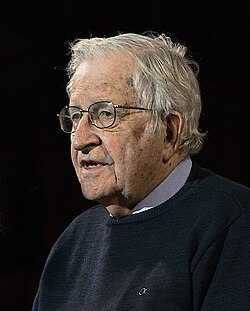Noam Chomsky Quote
Structural factors are those such as ownership and control, dependence on other major funding sources (notably, advertisers), and mutual interests and relationships between the media and those who make the news and have the power to define it and explain what it means. The propaganda model also incorporates other closely related factors such as the ability to complain about the media’s treatment of news (that is, produce flak), to provide experts to confirm the official slant on the news, and to fix the basic principles and ideologies that are taken for granted by media personnel and the elite, but are often resisted by the general population.1 In our view, the same underlying power sources that own the media and fund them as advertisers, that serve as primary definers of the news, and that produce flak and proper-thinking experts, also play a key role in fixing basic principles and the dominant ideologies. We believe that what journalists do, what they see as newsworthy, and what they take for granted as premises of their work are frequently well explained by the incentives, pressures, and constraints incorporated into such a structural analysis. These structural factors that dominate media operations are not allcontrolling and do not always produce simple and homogeneous results.
Structural factors are those such as ownership and control, dependence on other major funding sources (notably, advertisers), and mutual interests and relationships between the media and those who make the news and have the power to define it and explain what it means. The propaganda model also incorporates other closely related factors such as the ability to complain about the media’s treatment of news (that is, produce flak), to provide experts to confirm the official slant on the news, and to fix the basic principles and ideologies that are taken for granted by media personnel and the elite, but are often resisted by the general population.1 In our view, the same underlying power sources that own the media and fund them as advertisers, that serve as primary definers of the news, and that produce flak and proper-thinking experts, also play a key role in fixing basic principles and the dominant ideologies. We believe that what journalists do, what they see as newsworthy, and what they take for granted as premises of their work are frequently well explained by the incentives, pressures, and constraints incorporated into such a structural analysis. These structural factors that dominate media operations are not allcontrolling and do not always produce simple and homogeneous results.
Related Quotes
About Noam Chomsky
Born to Ashkenazi Jewish immigrants in Philadelphia, Chomsky developed an early interest in anarchism from alternative bookstores in New York City. He studied at the University of Pennsylvania. During his postgraduate work in the Harvard Society of Fellows, Chomsky developed the theory of transformational grammar for which he earned his doctorate in 1955. That year he began teaching at MIT, and in 1957 emerged as a significant figure in linguistics with his landmark work Syntactic Structures, which played a major role in remodeling the study of language. From 1958 to 1959 Chomsky was a National Science Foundation fellow at the Institute for Advanced Study. He created or co-created the universal grammar theory, the generative grammar theory, the Chomsky hierarchy, and the minimalist program. Chomsky also played a pivotal role in the decline of linguistic behaviorism, and was particularly critical of the work of B. F. Skinner.
An outspoken opponent of U.S. involvement in the Vietnam War, which he saw as an act of American imperialism, in 1967 Chomsky rose to national attention for his anti-war essay "The Responsibility of Intellectuals". Becoming associated with the New Left, he was arrested multiple times for his activism and placed on President Richard Nixon's list of political opponents. While expanding his work in linguistics over subsequent decades, he also became involved in the linguistics wars. In collaboration with Edward S. Herman, Chomsky later articulated the propaganda model of media criticism in Manufacturing Consent, and worked to expose the Indonesian occupation of East Timor. His defense of unconditional freedom of speech, including that of Holocaust denial, generated significant controversy in the Faurisson affair of the 1980s. Chomsky's commentary on the Cambodian genocide and the Bosnian genocide also generated controversy. Since retiring from active teaching at MIT, he has continued his vocal political activism, including opposing the 2003 invasion of Iraq and supporting the Occupy movement. An anti-Zionist, Chomsky considers Israel's treatment of Palestinians to be worse than South African–style apartheid, and criticizes U.S. support for Israel.
Chomsky is widely recognized as having helped to spark the cognitive revolution in the human sciences, contributing to the development of a new cognitivistic framework for the study of language and the mind. Chomsky remains a leading critic of U.S. foreign policy, contemporary capitalism, U.S. involvement and Israel's role in the Israeli–Palestinian conflict, and mass media. Chomsky and his ideas remain highly influential in the anti-capitalist and anti-imperialist movements.
